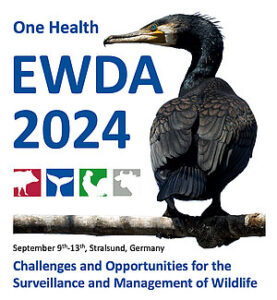VICTOR ROBERT SIMPSON, BVSc, DTVM, CBiol, FIBiol, MRCVS, FRSB, Hon FRCVS

18 February 1941 to 31st July 2018 – died aged 77 years.
One of the founders of wildlife disease surveillance in Great Britain and a passionate advocate for evidence-based conservation
Vic Simpson was born in Warwickshire, England, in 1941 and grew up with a strong interest in natural history. He graduated from the University of Bristol in 1964 and began his veterinary career with a spell in mixed practice in the West Midlands where he met Jane. Vic returned to further study in the late 60s, gaining the Diploma in Tropical Medicine from the Royal Dick in Edinburgh. He had an adventurous spirit: Vic’s next step was to convert a Land Rover to a mobile home and spend six months travelling across Europe, Turkey, Iran, Afghanistan and India, finally shipping the vehicle to Africa to join him for his new role. He took up the post of District Veterinary Officer in Kisumu, Kenya, and subsequently of Senior Veterinary Research Officer in Gaborone, Botswana. Jane became a teacher in the Kenya Highlands where they were married.
They returned to the UK and set up home in Cornwall in 1979, developing an idyllic property over the years into a beautiful family home, complete with a stunning pond where they and their many visitors would often spend time watching the local wildlife.
Vic became a Veterinary Investigation Officer for the MAFF (later VLA) in Truro. He developed close links with the local farmers and veterinary practices and was well respected as a conscientious investigator and livestock pathologist.

In 2001, at the start of his ‘so-called’ retirement, Vic was finally able to dedicate all his time and energy to free-living wildlife. He did this in his own unique way, converting an outbuilding in their backyard into the aptly named Wildlife Veterinary Investigation Centre, or Wildlife ‘VIC’, where he collected long term datasets and sample archives and studied the impact of diseases on wildlife species.
Vic could truly claim to have worked with all creatures great and small, attested by stories from colleagues who saw him tackle post-mortem examinations on a range of creatures from pygmy shrew to sei whale. He had an encyclopaedic knowledge of wildlife disease in both terrestrial and marine mammals and birds, and a lifelong ethic to share information through peer-reviewed publication. He is perhaps best known for his decades of work, at VLA and the VIC, studying the health of otters, red squirrels and bats, detecting and helping to understand the conservation significance of many conditions. He was involved in the characterisation of anthropogenic threats, such as cetacean bycatch and lead poisoning in mute swans, and helped raise awareness of measures that could be adopted for their mitigation.
Vic was a natural educator and shared his infectious enthusiasm to inspire the next generation. He trained vets and biologists at the Wildlife VIC, offering a unique opportunity to study wildlife pathology, and lectured on undergraduate and postgraduate courses in the field. He produced videos of post mortem examination protocols for birds of prey and otters, clearly demonstrating his logical and meticulous approach.
Vic gave decades of contribution to multiple veterinary and conservation organisations. He was one of the EWDA’s longest standing members and supported the organisation in many ways. Vic and Jane attended conferences together, always generous with their time, sharing ideas and experience with patience and interest, welcoming new attendees to the fold. Vic’s presentations captured the imagination. He was an excellent communicator, taking the audience through each step of the investigations that led to a novel discovery. He encouraged the EWDA student community at every opportunity, giving a memorable talk at the UK Student Chapter Symposium in 2016 on Wildlife Pathology, where he shared his experience of various investigations over the decades and their conservation impacts – motivating many to get involved. Vic’s significant contribution to the study of wildlife diseases was acknowledged in Berlin, 2016, when he received the Wildlife Disease Association’s Emeritus Award. In 2017, Vic gave a generous donation to set up a conference attendance fund to enable people of limited financial means to attend and present at EWDA conferences, ensuring many others may benefit from his legacy and share his passion.
Vic and Jane were married for 47 years and were an exceptional team. They worked so well together on a daily basis at the Wildlife VIC. Vic died peacefully at home on 31st July 2018 after a period of treatment for cancer. He is survived by Jane, their children Kate and Robert, and three grand-daughters, Martha, Florrie and Maddie.

Friends and colleagues have shared thoughts on Vic’s professionalism, scientific rigour, honesty, dedication, intelligence, tenacity, energy, creativity, drive, zest for life and tremendous, often irreverent, sense of humour – for these qualities he was widely loved, will be long remembered and sadly missed.
EWDA tribute amended from the Veterinary Record obituary published on November 30th 2018, written by Becki Lawson, Paul Duff, Fieke Molenaar and other friends and colleagues.


